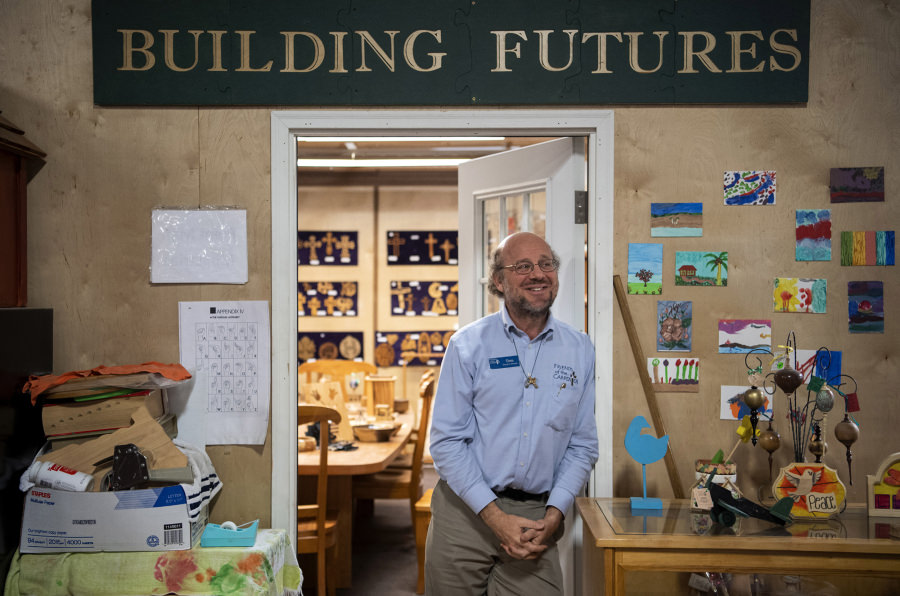After nearly a decade at Friends of the Carpenter, Tom Iberle announced in October that he would retire from the faith-based nonprofit.
Eventually.
The executive director plans to stick around to see through initiatives to put the nonprofit, which operates a wood shop and day center, on better financial footing. One of those initiatives is launching a pre-apprenticeship program for people considering a career in carpentry. The smaller weekly projects already occurring at Friends of the Carpenter could be an entry point for some participants.
“We’ve got the curriculum, we’ve got the workstations, we’ve got some of the volunteers lined up, we’ve got the insurance coverage. We haven’t got all of the funding in place yet, and so that’s still in process,” Iberle said.
He said starting a pre-apprenticeship program aligns with the nonprofit’s ethos of trying to help the vulnerable; in this case it’s the idea of teaching a man to fish, so he can feed himself.
The 61-year-old Iberle has been discussing his transition with the nonprofit’s board of directors for about four months.
“There’s been some changes going on in my life that are the main impetus behind this,” said Iberle, who pulled up a photo on his cellphone of a smiling baby. “That’s the main one,” he said of his grandson, Theo, who was born in July.
“We’ve been waiting quite a while for a grandchild, and he’s the main focus of our life right now,” Iberle said. “I don’t want to be in a position of possibly missing anything that starts coming up in his life.”
Also, Iberle and his wife Kathy, who retired from HP Inc., would like to travel while they’re still healthy.
Iberle started as a volunteer at Friends of the Carpenter when his younger son was in middle school and had a class trip to the nonprofit. This was before Friends of the Carpenter occupied its current warehouse in west Vancouver. Iberle served two stints as volunteer manager and became executive director in 2013.
He plans to work with the future executive director for at least a month or two, just as Duane Sich did with him. Sich launched Friends of the Carpenter in his own garage in the Lincoln neighborhood in the late 1990s and still volunteers doing woodworking.
Sich was one of the first people Iberle approached after announcing his retirement to the board.
“He’s disappointed a little bit, but he understands where I am in my life right now,” Iberle said.
The board of directors is assessing and restructuring its small staff, which includes rethinking what the executive director does. Iberle said he spends too much time on day-to-day operations and believes the future executive director should be out in the community more often.
“It’s encouraging and exciting for me because I think it’s going to be a lot more effective than what we have been doing,” he said.
That’s not to say Iberle isn’t involved in the community. He is a Rotarian and sat on Share’s board for a decade and plans to get more involved in the Society of St. Vincent de Paul after retiring.
Until then, Iberle and his successor are tasked with strengthening Friends of the Carpenter’s finances.
In October, the nonprofit held a dinner and auction bringing in $106,705. At the start of the year, the nonprofit began renting some warehouse space to Southwest Washington Woodturners, which holds monthly meetings, workshops and classes. And about a year ago, Friends of the Carpenter began selling some of its wood products at Main Street Trader in uptown Vancouver.
One of the furniture store’s owners, Karen Watkins, said the relationship “just makes sense” and she likes supporting the nonprofit.
“That means they can keep their lights on and keep doing what they do,” she said. “They’re amazing. I love it.”
It started with Friends of the Carpenter providing wood slabs and expanded to its finished products, she said. Most of the items are small pieces such as bowls, boxes and cutting boards, but the store also receives larger pieces; one recent acquisition is a dining table made with wood from a maple tree removed from Esther Short Park.
Watkins said customers can buy a piece of local history and simultaneously help Friends of the Carpenter continue its mission of serving those in need. Many trees removed by the city of Vancouver or Washington State Department of Transportation end up at Friends of the Carpenter to someday be cut and carved into wooden works of art.
Selling wooden projects as a revenue stream has its limits, though. After all, it’s primarily volunteer woodworkers who are creating the products that go in the store as well as custom items for churches, businesses and other supporters. Conference tables are a common request.
The nonprofit’s former thrift store was one of Iberle’s biggest challenges and regrets. In its heyday, 2nd Chance Thrift Store provided financial stability, but in 2017 revenue dropped to just $16,000. The store closed last year.
However, Iberle said the hardest day of his career — and probably his whole life — was when a man who lived in a duplex owned by Friends of the Carpenter was found dead after a Fourth of July weekend fire in 2014. The Vancouver Fire Department said the man died of smoke inhalation after a cooking fire in the transitional housing unit.
Iberle acknowledges his tenure at Friends of the Carpenter has “been an interesting journey” with “a lot of highs, but a couple of lows, too.”
Hosting a day shelter for Vancouver’s homeless remains its biggest accomplishment in Iberle’s eyes.
“We were the ones who stepped up and said, ‘We’ll host it.’ We had a little bit of difficulty with our neighbors over that,” Iberle said.
Friends of the Carpenter hosted the facility run by Share for three years. It was renamed the Vancouver Navigation Center and moved to Grand Boulevard where it’s faced more controversy and criticism from neighbors who lament its impact on the area. The city of Vancouver recently took over operating the facility.
During its time at Friends of the Carpenter, people got housing, employment or otherwise made progress with the help of professionals, Iberle said. It aligned with Friends of the Carpenter’s mission to provide safety, structure and purpose for vulnerable people whether they’re low-income or have a developmental disability or some other challenge; that applies to visitors and volunteers alike who may not be struggling financially or materially but could use spiritual and emotional support.
“They need to have people around them who are going to be able to listen and help them work through whatever’s going on in their lives,” Iberle said “We’re all vulnerable in some way, shape, or form. We all have things that we need to be working on.”
Betty Eves volunteered Wednesday, as she does most days of the week. While sanding a little wooden cutout, the 90-year old said volunteering gives her a needed activity, replacing free time she used to spend in her yard. Her motto is “stay busy, think positive.”
The goal is that everyone who enters Friends of the Carpenter’s friendship center leaves better than when they arrived.
“I feel like I’m doing that. I feel like I’m leaving better than when I arrived here. I do,” Iberle said.





